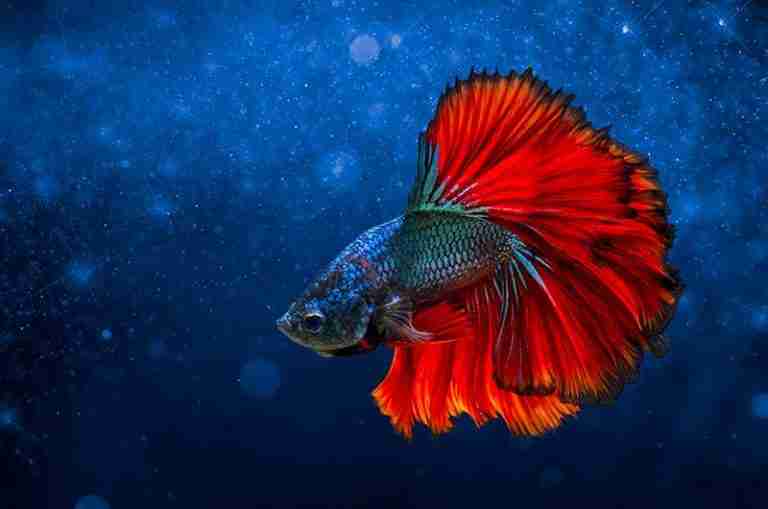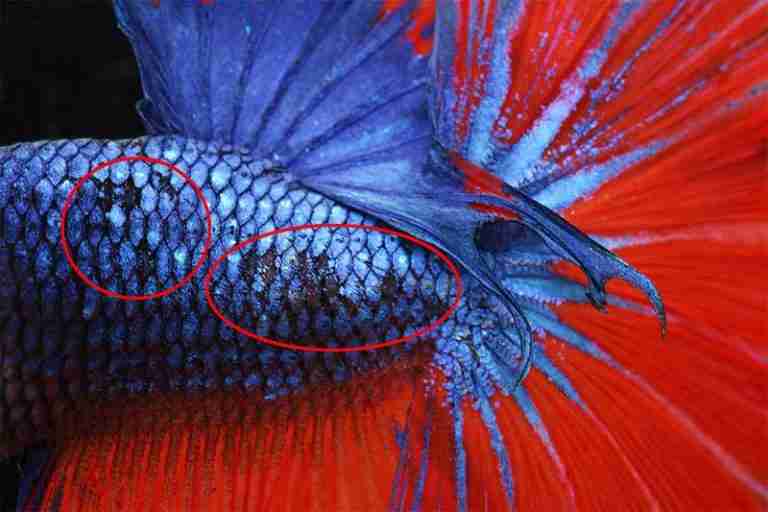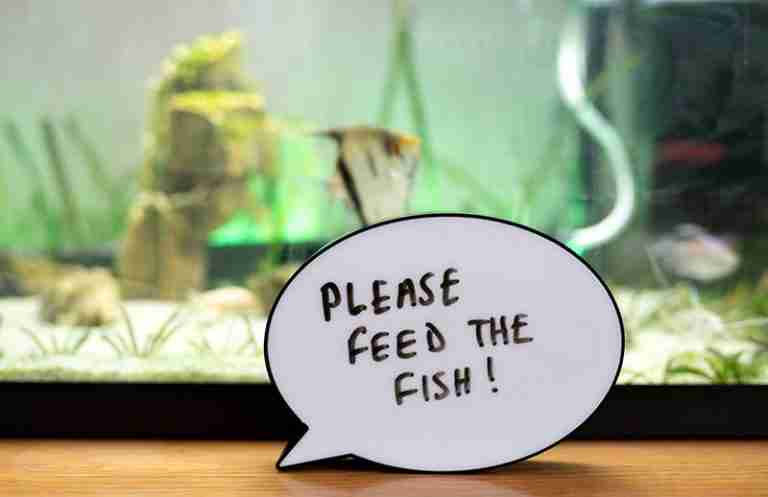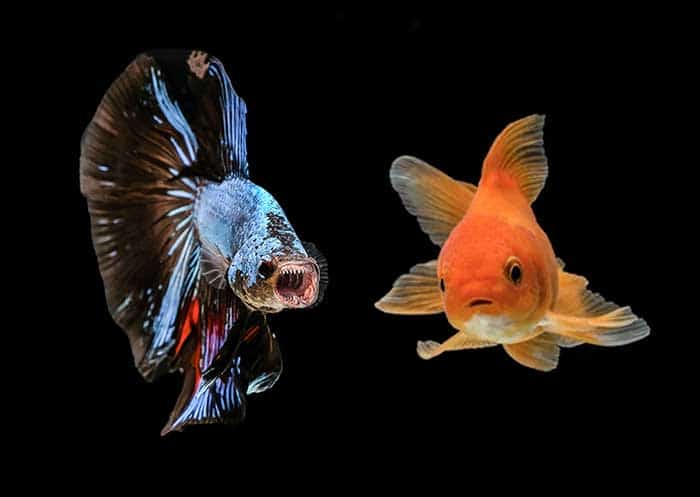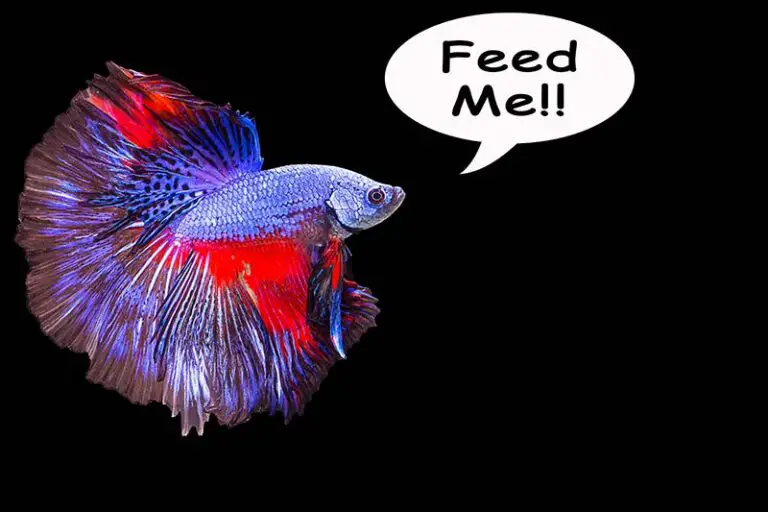How To Tell If Your Betta Fish Is Constipated (Causes and Treatments)
Constipation is not a fun experience for anyone, and our poor little pet fish can get constipated too. This short guide explains how to tell if your betta fish is constipated and provides practical advice on what you can do to relieve their digestive issues.
There are several signs that your betta may be constipated, such as:
- A constipated betta fish can look heavily bloated with a swollen stomach. A bloated betta fish may suffer from a swim bladder disorder caused by the bloated stomach pressing against the swim bladder.
- Your betta fish’s poop may appear soft and stringy with a pale color or dark and hard.
- Because constipation causes a blockage to the fish’s digestive tract, your betta may lose its appetite or may regurgitate food after eating.
- Constipated bettas may not move around very much and can appear quite lethargic.
- Constipation can affect the swim bladder and cause your betta to swim sideways or upside down.
Although constipation in betta fish may show many of the symptoms listed above, you must be careful when diagnosing. Many of these symptoms are indicators of other illnesses, so you can easily overlook more serious conditions such as dropsy.
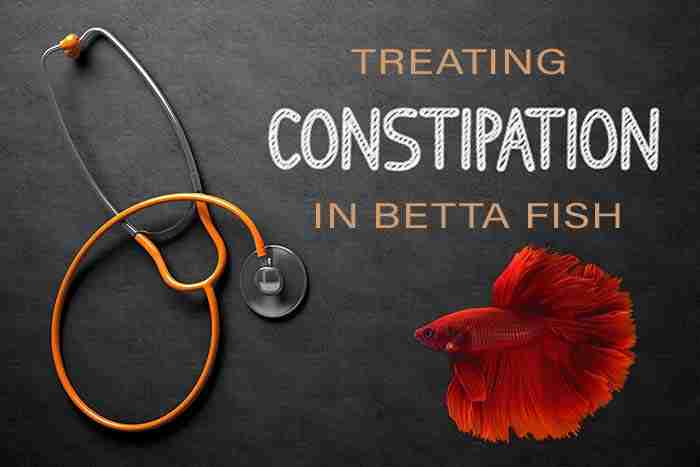
A poor diagnosis can lead to the needless suffering of your betta fish and potentially a death that you may have otherwise avoided.
Betta constipation is not usually something to be too concerned about and is very easy to treat. Throughout this article, I will talk about why betta fish get constipated, what should healthy betta poop look like, and how to treat constipation in betta fish.
If you are new to betta fish keeping, why not read our Betta Fish Care Guide And Species Overview For Beginners.
What Is Constipation In Betta Fish
Constipation in betta fish is quite common and often overlooked. So what exactly is constipation in betta fish?
Constipation in betta fish occurs when your betta’s digestive system cannot pass materials normally, so digested food accumulates and will eventually cause blockage inside your betta fish’s belly.
The blockage can result in your betta fish not eating, laying at the bottom of the tank, becoming listless, and in severe cases, even dying. You may also notice your betta flaring its gills, making it look angry, but this is just a way of tensing its muscles to remove the blockage.
Checking your betta’s poop is a surefire way to determine whether your betta fish is constipated. The color of betta stool can range from dark brown to light brown, with a slightly different shape depending on how well your betta digests its food.
In addition, if you have recently changed your betta’s diet or feeding schedule, your betta may also experience some digestive issues.
If you want to know when your betta is constipated, you should check its poop regularly.
How Often Do Betta Fish Poop
A healthy betta fish typically defecates once a day, but some things can cause this to change.
Betta fish get accustomed to a particular amount of food; if this changes, they may poop less or more than usual. A sudden change in what you feed your betta fish can cause a temporary change in bowel movements.
Although feeding your betta fish more than usual will not cause any harm, it may affect its poop schedule until the digestive system becomes accustomed to this amount of food.
Causes Of Constipation In Betta Fish
There are several causes for betta fish constipation, and knowing what they are, can help you prevent it or keep an eye on your betta fish if they are showing some of the signs of this condition.
Here is a list of possible reasons:
- Low temperatures – I am often asked the question, “Can betta fish live in cold water?” Betta fish are tropical fish, so cold water and a lack of food can cause betta fish to become more sluggish, causing their digestive system to slow down.
- Overfeeding – Too much food can cause the digestive system of betta fish to work overtime. When the digestive system can’t keep up, the fecal matter will build up and cause a blockage.
- Dry Foods – Feeding your betta fish food that is too dry may cause constipation. Betta pellets or freeze-dried foods contain very little moisture. Allowing these foods to soak briefly will help them to soften and expand before being consumed. If eaten dry, these foods will absorb water from the gut of your betta fish, where it will grow inside of them, causing heavy bloating and a potential blockage.
- Lack of fiber in their diet – Betta fish need plant matter to help them digest properly. A good quality betta fish pellet will provide them with all the nutrients they need and help keep their digestive system in check.
- Overall poor diet – Betta fish will benefit significantly from a varied diet consisting of live foods (fresh and frozen), and a small amount of plant or vegetables will aid digestion. Betta fish are carnivorous but will supplement with plant-based roughage in the wild.
- Stress – Betta fish that feel stressed or threatened by other fish can become more sedentary, and it’s harder for them to digest their food.
- Old age – Betta fish that have reached a ripe old age may have weaker digestive systems, and it will become more challenging for them to digest their food.
In most cases, betta fish constipation will be caused by a combination of the above factors, so it’s best to play detective yourself if you think your betta fish is constipated.
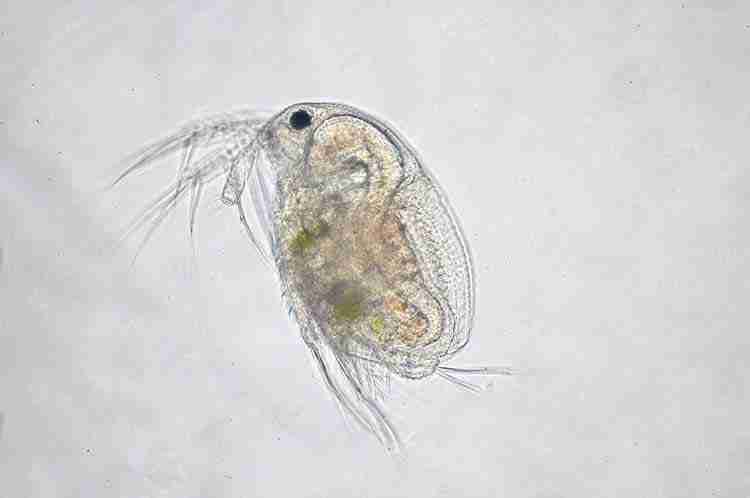
Constipated Betta – Signs and Symptoms
At the beginning of this article, I briefly covered some of the signs to look for when diagnosing constipation in betta fish. It is important to understand that many signs and symptoms of any illness or condition can also be present in many other conditions.
Always be cautious when diagnosing any condition because treating a wrongly diagnosed condition may allow the true condition to become so advanced that it will be untreatable. If you are ever unsure, speak to a trained professional.
What Does A Constipated Betta Fish Look Like
A constipated betta fish will have obvious signs that are easy to spot in most cases. Constipation in betta fish is quite similar to constipation in most animals and humans, and the signs to look for are also quite similar.
Below is a list of the most common signs and symptoms to look out for.
Heavily Bloated Betta Fish
A bloated betta fish is a common sign that it is constipated. There becomes a blockage in their digestive system, which can lead to your betta’s belly swelling, leaving your betta fish with a bloated stomach.
For more information on bloating, you can read Bloated Betta Fish (Easy fixes and prevention guide).
One of the signs you may notice is when the skin becomes thick and hard around your betta’s stomach, accompanied by visible bloat in the belly area.
A significant tell-tale sign is when your betta fish’s stomach appears to be protruding well beyond its ventral fins. The abdomen often swells up like a balloon, which may look like it could burst at any minute.
A swollen stomach can sometimes press on the swim bladder, causing it to malfunction and can lead to your betta swimming oddly, on its side, or upside down.
Betta Poop Is Stringy And Soft
If you notice your betta fish passing a soft and string stool, this is often a sign of a blockage in the betta’s digestive tract. Stringy poop will be like long slimy pieces swimming around, and you may even see them sticking to the surface of your betta fish’s tank or stuck to one another, forming long pieces of feces. Often you will see the poo trailing along still attached to your betta.
Betta poo becomes soft and stringy because the extra fluid inside their intestines tries to clear the blockage.
Hard And Dark Poop
The opposite of soft and stringy poop is hard and dark poop. Usually, this will be part of the blockage trying to pass, and there will be a lack of moisture mixed with the feces causing its dark color and more rigid texture, which may look like mini pellets. The hardening is often the cause of the blockage and can be caused by eating freeze-dried or pellet food which has not had the opportunity to soak and soften.
Loss Of Appetite
A constipated betta may lose its appetite or may even regurgitate its food after eating. Once the digesting food reaches the blockage, it will not pass through and begin to back up. If the blockage is severe and has lasted for a week or more, there will be no option other than for the food to come back up the same way it went down. Alternatively, your betta will just not eat at all.
Severe constipation, lasting for 7 to 10 days in humans, is known to cause a person to vomit their own feces, which is a very unpleasant experience, and fish are no different.
If your betta isn’t eating but doesn’t have other symptoms of constipation, you can find more information and advice in my article Why Won’t My Betta Fish Eat – 6 Possible Reasons Why.
Your Betta Appears Lethargic
It may be constipated if your betta is not moving around very much. Signs of a bloating belly will help to reinforce the potential that they are constipated. I know when I’ve eaten a big meal and feel bloated, I just want to sit still and have a nap.
Swim Bladder Disease
The swim bladder in fish is what helps with buoyancy and keeps them upright. A blockage caused by constipation can eventually press upon the swim bladder affecting its ability to function correctly. Often called swim bladder disease, it is not actually a disease but more of a disorder that can have many causes.
A malfunctioning swim bladder can cause your betta to swim sideways or upside down, which may keep bumping into things.
NOTICE
Always consider allowing a professional to make a diagnosis of any condition or illness to avoid overlooking more serious conditions that could become too advanced to treat.
Betta Fish Poop – Healthy VS Unhealthy
It may seem odd to take such an interest in your fish’s pooping habits, but having a little understanding can help you establish their general state of health.
What Does Betta Poop Look Like
A healthy betta fish poop should appear firm but not hard and will usually be a light or medium brown color. When your betta has good digestive health, the intestine will have adequate moisture to enable the food waste to travel along easily and create a healthy poop at the end.
A normal betta poop should not appear stringy, mucus-filled, or spongy as this will usually point to constipation, and if your betta’s poop is a dark brown and looks like it has little ridges running along it, this could be another sign that it is constipated.
Betta Fish Poop Color
Depending on your betta’s diet, its poop may be slightly different in color. For example, green betta poop can be caused by eating such things as peas and spinach, which can change the color of their waste. A betta that eats live food may be more pink or red.
A betta’s poop will generally resemble the color of the food they have been eating, so don’t be surprised by slight changes in your betta’s poop color.
White Stringy Betta Poop
If your betta’s feces is white and stringy, this could be a sign of internal parasites. Many symptoms of internal parasites are similar to constipation, such as bloating, lethargy, and a loss of appetite.
Betta Poop Ball – Is This Normal
Betta poop is often unlike other fish poop; instead, it can look like tiny pellets. Many owners report that they notice betta poop balls around their tank, and on some occasions, these balls can seem a little too big to have come from their betta fish.
You should note what your betta’s usual bowel movements look like, and then you can tell if the poop balls they produce are a little bigger than usual.
In most cases, it shouldn’t harm your betta’s health as long as its digestive tract is healthy and functional, but larger poop balls could be another sign of constipation.
How Often Do Betta Fish Poop
A betta fish can poop around 5-6 times daily with a healthy diet. Each betta fish is different, and their diet will dictate how often it will poop. If you fast your fish 1 or 2 days a week, this is good for their digestive system, and they will poop less during these times.
Each betta fish is different as some eat more than others and have different bowel habits. As I have already mentioned, the best advice is to keep note of your bettas eating and bowel habits at healthy times so that you will better notice any changes. A betta that appears only to poop 1 or 2 times a day is nothing to be concerned about if normal for them.
Constipated Betta Or Dropsy
I have mentioned above that white stringy poop could be an indication of parasites. Similarly, heavy bloating can be a sign of dropsy, a serious condition that will need prompt treatment, so you wouldn’t want to misdiagnose it as constipation.
How Can You Tell Between Constipation And Dropsy
Dropsy in betta fish is difficult to tell apart from constipation because many of the symptoms are similar. However, the main difference between betta constipation and dropsy is extreme body swelling and bloating of the stomach when dropsy is present. This extreme swelling is caused by fluid build-up beneath the skin.
The bloating caused by dropsy is different from that of constipation in that the scales will usually stick out, resembling a pine cone, and has therefore become known as pineconing. If you look down on your betta from above, it will be easier to notice this pineconing of the scales.
It would be best to always air on the side of caution when diagnosing yourself and never assume that constipation is the cause, as it could easily be a more serious illness. If swelling of the body, bloating, and pineconing is present, antibiotic treatment is often required to treat dropsy before it becomes fatal.
If ever you are unsure, you should always contact a vet or fish specialist, or at least until you have the experience and knowledge to make a confident diagnosis by yourself.
How To Treat Constipation In Betta Fish
Treating a constipated, bloated betta fish isn’t very difficult. You can use many methods to relieve that bloated belly, so if your betta fish has constipation, it’s best to get it some help as soon as possible to treat the problem before it gets worse.
When you understand how to help a betta fish with constipation, you will realize that it isn’t that difficult, and the methods are quite easy to implement, even without experience.
Below I will talk about some of the methods I and other betta owners have used.
Epsom Salt For Betta Constipation
Give your constipated Betta Epsom Salt Treatment! What is this, you might be asking?
Many people use an Epsom salt bath for fish constipation as it is known to relax the bowel and aid the movement of fecal matter. Some of the Epsom salt is absorbed through the fish’s body and enters the bowel, drawing in further moisture and softening the blockage.
If using Epsom salt for betta constipation, the usual dose is approximately 1 teaspoon of salt to 5 gallons of water. I would usually take some tank water into a container, add the Epsom salt, stir it well until dissolved, and then add the water to a temporary treatment tank (quarantine tank). If you decide to add it to your main tank, that’s fine, as it shouldn’t harm any live plants or other tank mates.
Daphnia For Betta Fish Constipation
Many people swear by using daphnia for betta fish constipation. Daphnia are small freshwater fleas. They are highly nutritious and can have a mild laxative effect. You can buy live daphnia, although it may be easier to purchase freeze-dried or, even better, frozen daphnia.
Freeze-dried daphnia will need to be soaked in warm water for 5-10 minutes or until it becomes soft and expands fully, as this will stop it from expanding inside your betta’s tummy, causing further blockage.
Most betta fish enjoy eating daphnia, which may temporarily alleviate a lack of appetite. Feed you betta as many daphnia as you like until the blockage has passed successfully.
Find Live Daphnia Or Freeze-Dried Daphnia On Amazon
Mysis Shrimp
Mysis shrimp is also a good constipation treatment and an excellent alternative to daphnia, although the laxative effects are not quite as potent. They are pretty high in fiber and will have a positive impact on your fish’s constipation.
You can buy, prepare, and feed Mysis shrimp the same way I described above for daphnia.
Find the best price for Mysis Shrimp At Amazon Or Chewy
Blanched Pea
Although betta fish are classed as carnivorous fish, in the wild, they will eat a small amount of plant-based food to support good digestive health. A very popular constipation treatment for betta fish is to give them a frozen pea blanched to make it softer.
There are several ways to feed a pea to your betta, usually a surefire way of removing that bloated belly.
Personally, I like to add the whole pea into the tank after blanching it for 1 or 2 minutes in boiling water, or just hot tap water will do, which will soften it, or you can peel off some of the outer leaves and add them directly to the betta tank. If your betta struggles to eat the pea, you can try squashing it up between your fingers, making it a little mushier.
Don’t be surprised if your betta’s poop turns a little green afterward!
Flaring
Betta fish will flare when they are excited, angry, or having a stretch. The simple act of gill flaring will flex many of a betta fish’s muscles, and this alone is often an excellent way to help your betta shift a blockage.
To make your betta flare, you can dip your finger into the betta tank and gently wave it in front of them. Adding a small mirror into the tank is also a great way to get your betta to flare, as they will see their reflection and assume it to be a threat. Read my article: Do Betta Fish Like Mirrors for a little more insight into the use of mirrors.
You will know when your betta is flaring because their gills will stick out quite prominently, making them look more significant to a potential threat.
Betta flaring is quite a common behavior, is an excellent exercise for them, and is generally harmless. However, constant flaring may be a sign of an unhappy fish that may become stressed if the cause of the flaring is not removed from the tank.
Good Quality Betta Food
Because food plays a large role in your betta’s digestive health, it is important to feed it a mixture of fresh and good-quality commercial foods. It is not always easy to find fresh, live foods, but freeze-dried or frozen foods are the next best thing, especially if soaked for a few minutes before feeding.
My Recommendations
In the past, I have often limited my fish food purchases to local fish stores and pet shops, but there is a huge variety of quality brands available online at retailers such as Chewy.com and Amazon, which I highly recommend checking out at the links below.
Change How Often You Feed Your Betta
Changing your betta’s feeding frequency can dramatically affect its digestive behavior. Although this is more of a preventative measure, it can sometimes help to cure constipation.
Fasting Your Betta
Many owners will feed their betta fish 2 or 3 times a day, every day, and although this is fine most of the time, fish will often benefit from 1 or 2 days of fasting each week. To fast your betta, you will not feed them on the fasting days, which will help their digestive system get some rest and allow the current digesting matter to move through their system.
Fasting will not harm your fish. In fact, wild betta don’t eat every day in their natural habitat because food is not available whenever they want it. Fasting occurs naturally when your betta loses its appetite, and this is often enough for the problem to rectify itself naturally.
You can choose to fast your fish for either 1 or 2 days a week (no more), and it is entirely up to you whether you carry out the fasting over 2 concurrent days or have 1 day of fasting every 3 to 4 days.
I fast all of my fish on Saturdays and Sundays, and during these days, they will often hunt out any leftover food waste from the substrate. Fasting is considered beneficial to the human digestive system, which will also benefit general health.
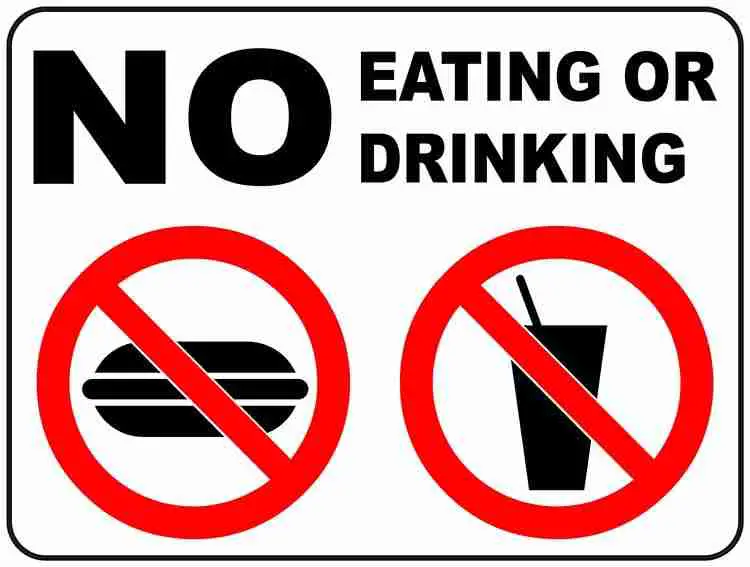
Overfeeding
Overfeeding your betta can sometimes be a contributing factor to causing constipation. However, if you are not overfeeding your fish, deliberately overfeeding for a short time may help push the blockage through.
This tactic will only be helpful if your betta has not lost its appetite, and it is not my first choice of cure by a long way as it may compound the problem rather than fix it.
How To Prevent Constipation In Betta Fish
Although there are many effective ways of treating constipation in betta fish, preventing constipation is a far better option and will save your betta from undue stress.
If you want to get your betta pooping regularly, follow the simple steps below. Although you may never eliminate the problem completely, you can heavily reduce the risk.
- Limit dried and freeze-dried foods – Betta pellets, flake food, and freeze-dried food will lack moisture and expand in the stomach, often leading to a bloated betta.
- Provide your betta with a balanced diet – Pellets and freeze-dried foods are fine but make sure to provide live or frozen foods that are rich in fiber and moisture. Brine shrimp, mosquito larvae, other insect larvae, and bloodworms are all favorites. Also, provide some softened vegetables and consider algae wafers.
- Avoid overfeeding your betta – Overfeeding can easily lead to constipation. Your betta will only need as much food as it can consume within a few minutes and will only need feeding 2-3 times per day. Many betta owners will only feed their fish once per day. Overfeeding will also lead to a build-up of food waste in your fish tank, which can increase bacteria.
- Consider Fasting your betta fish for 1 or 2 days a week – As I have described above, fasting has many benefits. It will allow your betta’s digestive system to rest and help clear food from its digestive tract. It may seem counterintuitive to starve your fish for a day or 2, but it will not harm your betta at all. If you are concerned about leaving your betta without food.
- Help your betta get some exercise – Your betta tank needs to be big enough to have room to exercise. A tank that measures at least 5 gallons should suffice. There are many exercise toys that you can buy for your betta, or you can make your own. A ping pong ball is a favorite toy, and it may get your betta flaring which is excellent exercise. I also mentioned earlier that a straightforward mirror could help get your betta moving.
Wrap Up
Hopefully, this guide has shown you how to tell if your betta fish is constipated and provided you with plenty of advice in understanding some of the most common causes of constipation in betta fish. Keeping tropical fish is not just about having a beautiful tank setup; it is also about maintaining healthy fish.
Unknowingly providing your fish with a poor diet or one that is not varied enough can cause a blockage in your fish’s digestive tract, leading to bloating and eventually causing constipation.
There is a wide variety of betta foods available. By including a variety of live and frozen foods and soaking dry foods for a short time, you can avoid the leading cause of betta constipation. Don’t forget to add in a bit of vegetation now and again for added roughage.
Remember that many of the symptoms you will see in constipated bettas can also point to other more serious illnesses and ensure that misdiagnosis doesn’t lead to prolonged suffering without proper treatment.


